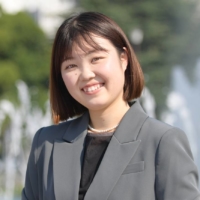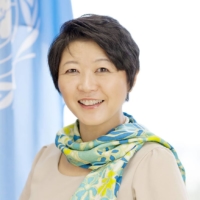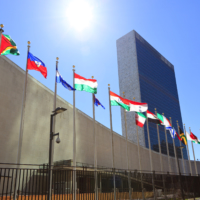2022 has been an important turning point as many countries around the world renewed their determination to cooperate with each other to abolish nuclear weapons in the face of the looming nuclear threat arising from the Russian invasion of Ukraine.
Against this backdrop, Kaoru Nemoto, director of the United Nations Information Centre in Tokyo, and Suzuka Nakamura, a university student who founded Know Nukes Tokyo in May 2020, discussed the current status of nuclear disarmament and called for Japan’s further contribution.
Nakamura started the movement against nuclear weapons in her hometown of Nagasaki as a high school student. Now she is expanding her work to conduct campaigns aimed at a world without nuclear weapons and provide peace education in schools.
Here are some excerpts from their dialogue:
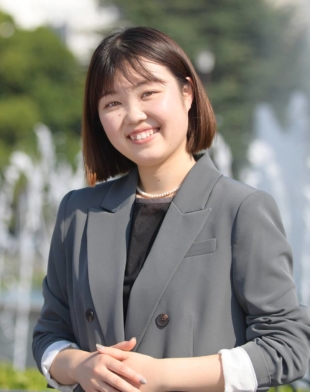
Nakamura: In June, Japan sent a government delegation to the 2022 Conference on the Humanitarian Impact of Nuclear Weapons, where I separately gave a speech as one of the third-generation descendants of atomic bomb victims. Toward the end of the speech, I mentioned how disappointed I was that the Japanese delegation would not be participating in the First Meeting of States Parties to the Treaty on the Prohibition of Nuclear Weapons, which began the following day. This comment drew some applause. I felt it was proof that Japan is regarded as a special country in the context of nuclear disarmament and is expected to send out messages that no other countries can express. I feel the world is waiting for Japan to join the treaty.
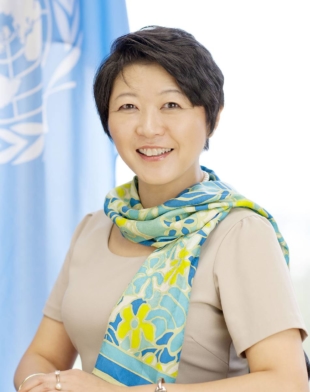
Nemoto: Even if Japan is not a signatory to the treaty yet, there are ways to clarify its stance, such as by explaining why Japan is not ready to join the treaty and in what way Japan can still contribute to global nonproliferation efforts. It was a step forward that Prime Minister Fumio Kishida became the first Japanese prime minister to attend the Review Conference for the Treaty on the Non-Proliferation of Nuclear Weapons this year, and gave a speech while he was there. The United Nations is welcoming this move as momentum. The prime minister proposed the establishment of a fund to preserve the stories of aging atomic bomb victims and to engage more people from around the world, including more youths, in nonproliferation activities within the framework of the Hiroshima Action Plan that he announced in the speech. The United Nations is now working out details with the Japanese government.
Nakamura: Indeed, the fact that the prime minister is spreading Japan’s messages through the Hiroshima Action Plan and at other opportunities is appreciated by the global community. There is also a shared understanding that Japan is in a harsh security environment. To be honest, I don’t think that Japan can become independent of the U.S. nuclear umbrella and sign the treaty overnight, given the complexities of the current situation. But we must not disseminate the wrong message that Japan approves of nuclear arms. As the only country to have suffered atomic bombings, we need to emphasize the inhumane nature of nuclear arms as an absolute evil, not a necessary evil.
Nemoto: Seeing and feeling the devastation nuclear weapons caused may help leaders make important decisions. Secretary-General of the United Nations Antonio Guterres visited both Hiroshima and Nagasaki when he was a civilian. This experience made Portugal, which had abstained in the past, vote for the first time against the resumption of nuclear testing in the Pacific when he was prime minister. This summer, he disseminated his message of nuclear disarmament to the world from Hiroshima during the Peace Memorial Ceremony as the first secretary-general to attend the memorial ceremonies of both Hiroshima and Nagasaki.
Nakamura: There is much more Japan can do to show how serious we are, such as announcing Japan’s policies and a timeline for joining the treaty. Japan should not disregard such a great opportunity as the TPNW Meeting of States Parties. Even if Japan is not one of the states parties, we should do what we can do now, such as attending the conference as an observer and sharing Hiroshima’s and Nagasaki’s experiences. A true leader of nuclear disarmament is someone who is involved in all the related meetings, such as NPT Review Conferences and the Meetings of States Parties to the TPNW, and is committed to bringing the world together, acting as a mediator between countries that own nuclear weapons and those that do not. Japan should start taking the steps needed to become such a leader.
Nemoto: The United Nations connects youths from around the world and helps them learn from each other. Efforts by young people in Japan to eliminate nuclear weapons inspire international society to unite stronger to create a world without nuclear weapons.
Nakamura: Such opportunities offered by the United Nations are very important for us because we feel it is a must to connect with young people from around the world to share our insights. For us Japanese, nuclear weapons are primarily associated with what happened 77 years ago in a historical context, while young people in the rest of the world take this issue as their own, being aware that they are living this moment with over 12,000 such weapons. To gain deeper and broader understanding of the issue of nuclear weapons from diverse perspectives and in relation to various other topics, such as environment or gender issues, we are planning to invite young people from around the world to an international event early next year.



